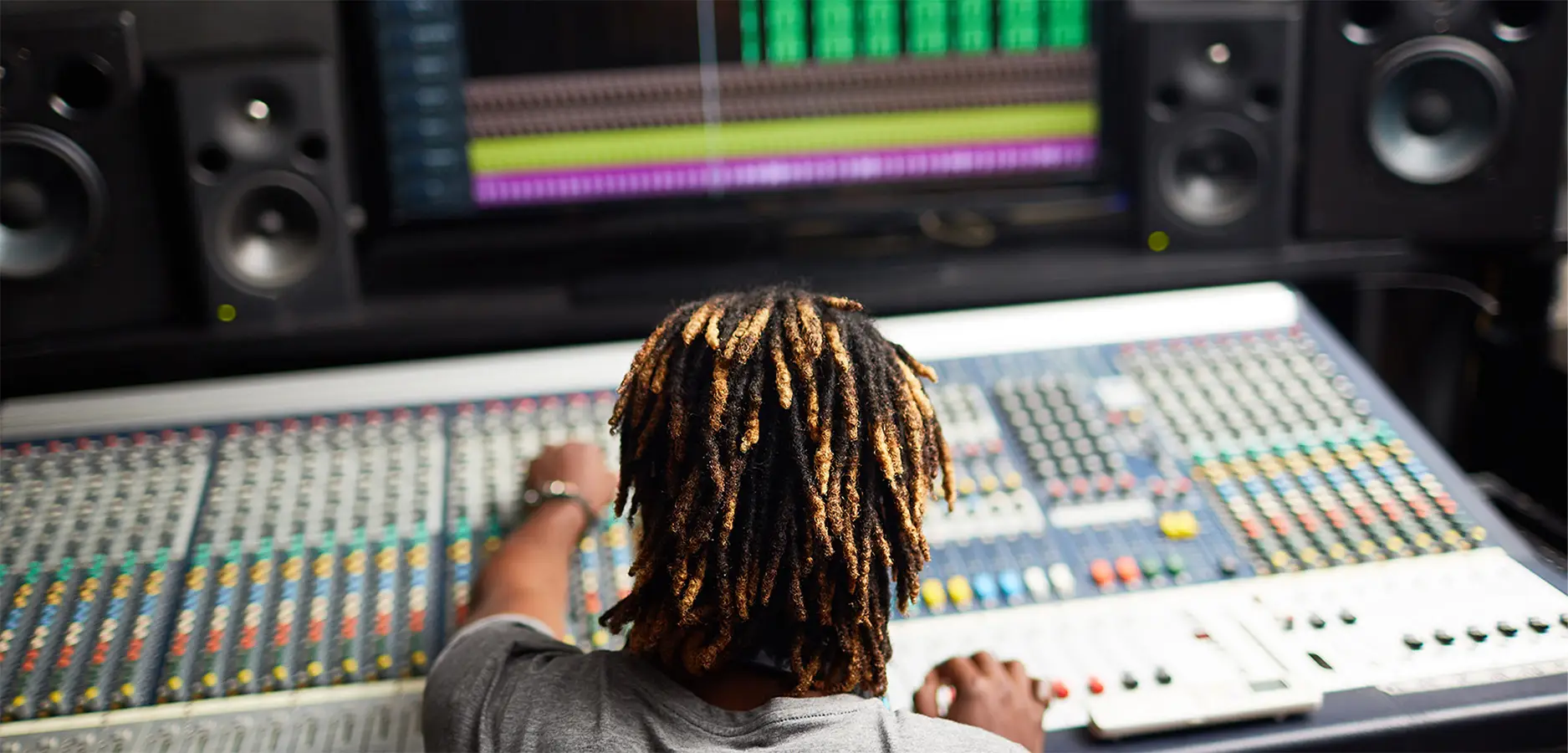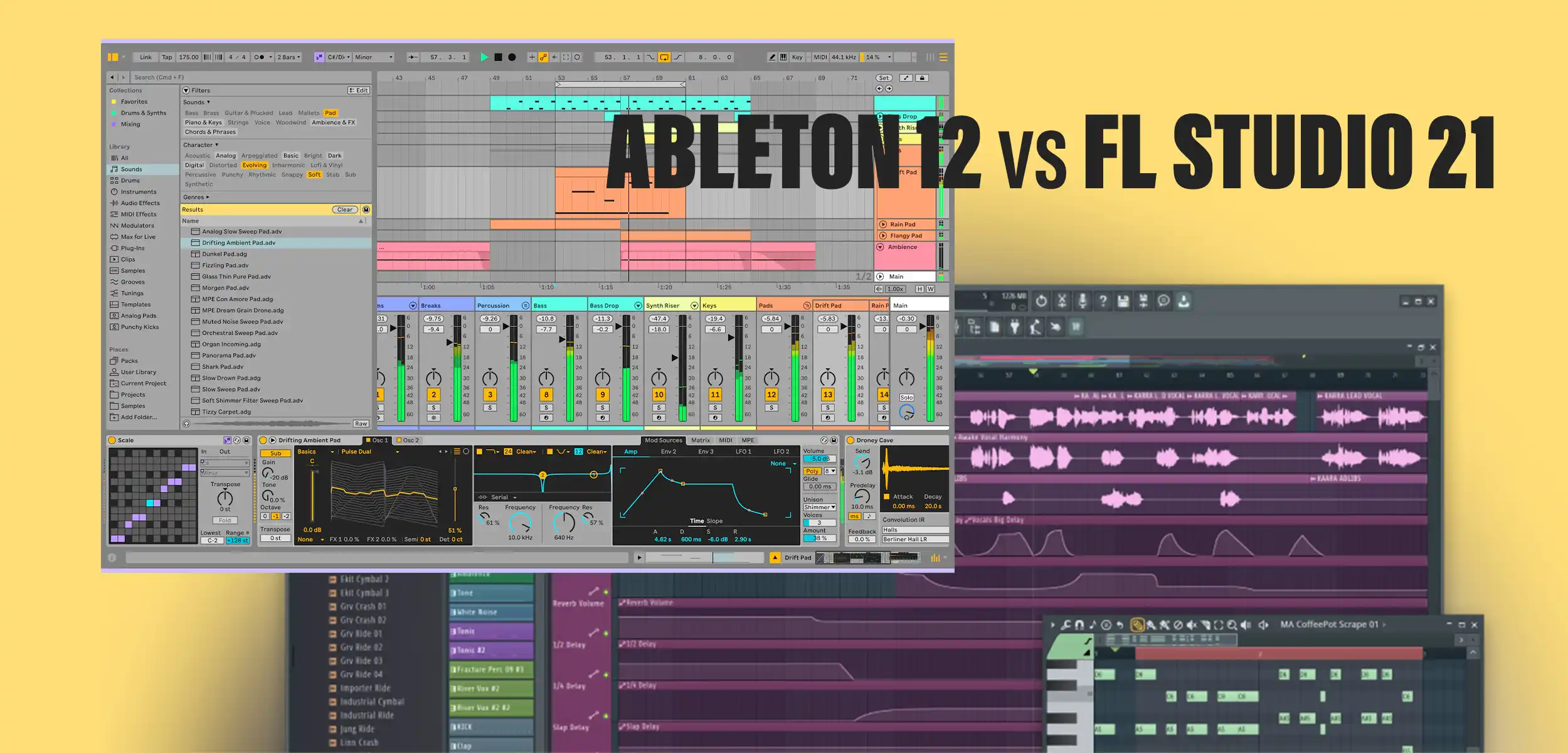Choosing between FL Studio and Ableton Live 12, two leading Digital Audio Workstations (DAWs), can be challenging for music producers.
Each offers unique features tailored to various aspects of music production, appealing to different user preferences and needs.
Key Takeaways
- FL Studio offers a user-friendly interface, comprehensive sound library, and lifetime free updates.
- Ableton Live 12 focuses on creativity and workflow enhancements with advanced MIDI tools and new sound design features.
- FL Studio is compatible with Windows and macOS and supports hardware integration.
- Ableton Live 12 introduces features like MIDI Generators, Sound Similarity Search, and improved workflow tools.
- Both DAWs have been used by top artists and offer robust features for music production.
Overview of FL Studio and Ableton Live 12
FL Studio and Ableton Live 12 are two prominent DAWs, each offering a plethora of features for music production. FL Studio emphasizes a user-friendly environment with extensive tools for composition and sound design. In contrast, Ableton Live 12 enhances creativity and workflow for live performances and studio work. Both software options meet the diverse needs of music producers but differ in their specific offerings and approaches.
FL Studio Features
Editions and Updates
FL Studio is marketed in four distinct Editions: Fruity, Producer, Signature, and All Plugins. Each version caters to varying skill levels and production needs. A notable advantage is the Lifetime Free Updates policy, ensuring users remain up-to-date with the latest developments without additional charges.
Compatibility and Integration
The DAW is compatible with both Windows and macOS, making it accessible to a broad range of users. FL Studio also supports integration with various hardware, including keyboards, synths, and MIDI controllers. This allows seamless connectivity for complex setups.
Instruments and Effects
FL Studio offers a comprehensive selection of over 100 built-in instruments and effects. The software includes exclusive features like Gross Beat for time manipulation and FLEX, a versatile synth and sound library. This array of tools provides producers with the flexibility to create diverse musical styles.
FL Cloud
FL Cloud is a companion service providing loops, mastering, and distribution services. Users receive a complimentary one-month subscription, which can aid in the final touches of their music production process and streamline distribution to major streaming platforms.
Ableton Live 12 Features
New Features
Ableton Live 12 introduces several key features aimed at enhancing music creation. The addition of MIDI Tools allows for intricate pattern reshaping, while MIDI Generators facilitate idea generation. Max for Live Transformations offers deeper MIDI manipulation, granting producers advanced control over their compositions.
Keys and Scales
This feature aids in maintaining harmonic consistency by ensuring compositions stay within key. This makes it easier for users to compose musically coherent tracks without needing extensive theoretical knowledge.
Sound Design
The Roar device introduces options for sound coloring and saturation, while Granulator III provides expressive control over granular synthesis. Lost and Found offers unique instruments and samples, expanding the palette of sounds available to users.
Performance Packs
Ableton Live 12 includes specialized packs such as:
- Performance Pack
- Golden Era Hip Hop Drums Pack
- Trap Drums Pack
These packs are designed for live performance and beat creation, catering to producers and live performers alike.
Workflow Improvements
Workflow enhancements in Live 12 include Mixer visibility toggles, stacked Clip and Device Views, and a tagging system for easier sound organization. The Sound Similarity Search function streamlines the sound selection process, allowing for quicker and more efficient production sessions.
Comparison of User Experience
User Interface
FL Studio’s user interface is noted for its visually rich and intuitive layout, designed to facilitate ease of use with drag-and-drop functionality. The step sequencer and piano roll are particularly user-friendly, making it accessible for beginners.
Ableton Live 12, however, prioritizes a straightforward, minimalist design with its Session View and Arrangement View, aimed at streamlining both live performances and studio work. This allows for quick navigation and seamless workflow.
Ease of Use
FL Studio’s learning curve is generally considered smoother for beginners due to its straightforward interface and comprehensive tutorials. The software provides an environment conducive to experimentation.
Ableton Live 12, while equally powerful, may require more time to master due to its depth and the specialized features it offers. However, its flexible nature allows experienced users to explore complex compositions and live performances efficiently.
Performance and Stability
Both FL Studio and Ableton Live 12 are known for their robust performance and stability. FL Studio performs well on both Windows and macOS, offering reliable operation during intensive tasks.
Similarly, Ableton Live 12 is optimized for stability, ensuring consistent performance during live sets and studio sessions. Frequent updates and strong community support further enhance the reliability of both DAWs.
Pricing and Value
FL Studio Pricing
FL Studio is offered in four Editions: Fruity, Producer, Signature, and All Plugins. Each Edition caters to various levels of expertise and needs.
Pricing starts at $99 for the Fruity Edition and increases to $499 for the All Plugins Bundle. Key highlights include the Lifetime Free Updates policy.
This ensures users access to all future updates at no extra cost, enhancing the long-term value of the software.
Ableton Live 12 Pricing
Ableton Live 12 is available in three Editions: Intro, Standard, and Suite.
The Intro Edition costs $99, Standard is priced at $449, and Suite is $749.
Each Edition offers a distinct set of features and instruments, allowing users to select the version that fits their production needs and budget.
Conclusion
Choosing between FL Studio and Ableton Live 12 depends on user needs.
FL Studio excels in a user-friendly interface and comprehensive tools.
Ableton Live 12 focuses on advanced features and workflow for creative exploration.
Frequently Asked Questions
What are the main differences between FL Studio and Ableton Live 12?
FL Studio offers a user-friendly interface, an extensive sound library, and lifetime free updates. Ableton Live 12 focuses on creativity and workflow with advanced MIDI tools, performance packs, and sound design features.
Which DAW is better for beginners?
FL Studio is generally considered easier for beginners due to its intuitive interface and comprehensive tutorials. Ableton Live 12 offers more advanced features that may require a steeper learning curve.
Can both software run on Windows and macOS?
Yes, both FL Studio and Ableton Live 12 are compatible with Windows and macOS.
Do they offer free updates?
FL Studio provides lifetime free updates, while Ableton Live 12 offers updates without an additional lifetime guarantee.
Are these DAWs used by professional artists?
Yes, both have been used by top artists. FL Studio is known for its user-friendly environment, while Ableton Live 12 is popular for its performance and creative tools.
Read other articles
 April 4, 2025
April 4, 2025Stop Letting AI Master Your Tracks (Here’s What You’re Missing)
Stop Letting AI Master Your Tracks (Here’s What You’re Missing)
 April 4, 2025
April 4, 2025AI Mastering vs Human Ears: Why Real Experience Still Wins
AI Mastering vs Human Ears: Why Real Experience Still Wins
 April 4, 2025
April 4, 2025What You Learn from Watching Your Track Get Mixed
What You Learn from Watching Your Track Get Mixed

